Confidence is returning to Cyprus’ housing market
There have been eight long years of house price falls. Now Cyprus’ housing market is gaining momentum, with both sales transactions and construction activity rising strongly.
During the year to Q1 2019, the nationwide residential property price index rose by 4.3% (2.9% inflation-adjusted), its tenth consecutive quarter of y-o-y growth, according to the Cyprus Statistical Service (CYSTAT). In fact, it was the biggest annual rise since Q2 2008.
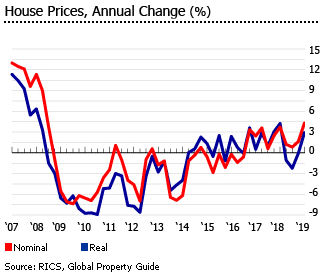
On a quarterly basis, residential property prices increased 0.8% (0.9% inflation-adjusted) in Q1 2019.
By district, during 2018:
- Nicosia, Cyprus’ capital, apartment prices rose by 1.2%, and house prices increased by 0.5% from a year earlier.
- In Limassol, apartment prices rose by 8.6%, while house prices increased by 1.6%.
- In Larnaca, apartment and house prices rose by 2.7% and 1.1%, respectively.
- In Paphos, apartment prices rose by a robust 5.3%, while house prices fell 2%.
- In Famagusta, apartment and house prices rose by 4.9% and 4.4%, respectively.
During the first half of 2019, property sales in Cyprus rose by 24.4% to 5,560 units from a year earlier, following annual rises of 5.8% in 2018, 23.7% in 2017, 42.6% in 2016, 9.4% in 2015 and 20.2% in 2014, based on figures from the Department of Lands & Surveys.
Likewise, the number of dwelling permits soared 38.4% y-o-y to 2,481 units during the first four months of 2019, according to the Statistical Service of Cyprus.
This across-the-board housing market improvement is partly driven by Cyprus’ robust economic growth over the past three years. In 2018, the economy expanded by 3.9%, following growth rates of 4.8% in 2016 and 4.5% in 2017, according to the Statistical Service of Cyprus. However, economic growth is projected to slow to 2.9% this year and to 2.6% in 2020, amidst slowing tourism and escalating trade tensions globally, according to the European Commission.
Despite this, the housing market is expected to continue to improve in the coming months, thanks to strong demand and improvements in the banking system.
The Cyprus real estate market has historically been divided into the major urban centres of Nicosia, Limassol and Larnaca (primarily driven by local demand); and the seaside resort areas of Paphos and Famagusta, which are mostly driven by foreign demand. The economic decline of recent years affected both areas.
Foreigners can buy one home in Cyprus, and are entitled to hold land freehold, but there is a maximum limit on land ownership of 3 donums (4,014 sq. m.).
Brief history of Cyprus’ housing market
Cyprus’ housing market started to decline in 2009, mainly due to the global financial meltdown, according to the Central Bank of Cyprus (CBC), after robust house price increases of 22.06% (17.46% inflation-adjusted) in 2007 and 9.73% (7.47% inflation-adjusted) in 2008.
HOUSE PRICES IN CYPRUS, ANNUAL CHANGE (%) |
||
| Year | Nominal | Inflation-adjusted |
| 2009 | -1.86 | -3.83 |
| 2010 | -3.57 | -5.13 |
| 2011 | -4.96 | -8.55 |
| 2012 | -4.71 | -5.75 |
| 2013 | -8.50 | -6.34 |
| 2014 | -8.02 | -6.66 |
| 2015 | -1.80 | -0.84 |
| 2016 | -0.94 | -0.69 |
| 2017 | 1.52 | 2.11 |
| 2018 | 1.62 | -0.07 |
| Sources: Central Bank of Cyprus, Cyprus Statistical Service, Global Property Guide | ||
House prices fell by 30% (32.3% inflation-adjusted) from 2009 to 2016.
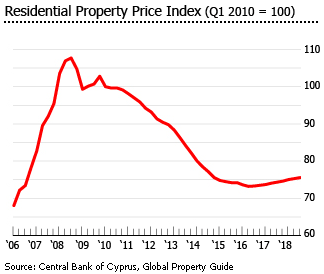
Cyprus’ housing market started to stabilize in Q1 2017, amidst an improving economy. House prices rose by 1.52% (2.11% inflation-adjusted) in 2017 and 1.62% (-0.1% inflation-adjusted) in 2018.
Residential construction activity rising, but still far below peak levels
In 2018, there were 6,201 dwelling units authorized in Cyprus, up by more than 25% from a year earlier, according to the Cyprus Statistical Service.
During the first four months of 2019:
- The number of permits issued for residential construction rose by 10.4% y-o-y to 1,542 units
- The area of residential permits surged 38% to 537,576 square meters (sq. m.) from the same period last year
- The value of residential building permits increased 28.2% to €495.9 million (US$555.3 million) over the same period
- The number of dwelling permits soared 38.4% y-o-y to 2,481 units.
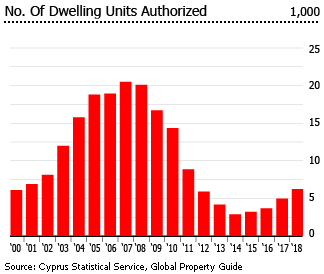
From an average of 18,000 units authorized annually from 2004 to 2010, dwelling permits fell to under 5,000 units per annum from 2011 to 2018.
Property sales increasing, but still far below pre-crisis levels
In 2018, property sales in Cyprus rose by 5.8% to 9,242 units from a year earlier, following annual rises of 23.7% in 2017, 42.6% in 2016, 9.4% in 2015 and 20.2% in 2014. Despite this, sales remain far below the pre-crisis levels. Sales were at an average of 18,000 units in 2002-2007.
During the first half of 2019, total property sales in Cyprus rose by 24.4% to 5,560 units from a year earlier, based on figures from the Department of Lands & Surveys. Over the period, domestic buyers accounted for about 55% of the total sales while overseas buyers (both EU and non-EU citizens) accounted for the remaining 45%.
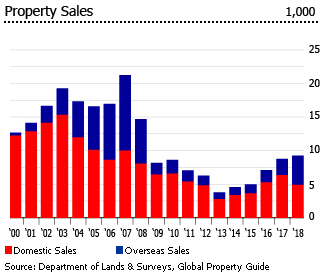
By major urban centres:
- Nicosia registered 1,010 sales contracts in the first half of 2019, up by 29% from a year earlier.
- In Limassol, property sales rose by 19.6% y-o-y to 1,987 units over the same period.
- In Paphos, sales contracts surged 36.5% y-o-y to 1,416 units.
- In Larnaca, property sales rose by 17.7% y-o-y to 772 units.
- In Famagusta, sales contracts rose by 10.1% y-o-y to 372 units.
Strong interest from foreigners, and predominantly from non-EU buyers, continued to be a driving force for the housing market this year.
“Transactions involving foreign investors have more than doubled with Limassol and Paphos having the lion’s share with 70% of transactions involving foreigners,” said Constantinos Savvides, director of PwC’s Real Estate Advisory department.
Interest rates continue to fall
Interest rates in Cyprus remain low, following European Central Bank (ECB) key rates. As of June 2019, the following average housing loan rates applied in Cyprus:
- Interest rate fixation (IRF) of up to 1 year: 1.51%, sharply down from 3.23% in June 2018 and from 2.97% in June 2017
- IRF over 1 and up to 5 years: 2.28%, down from 2.43% a year ago and 2.41% two years ago
- IRF over 5 years: 2.38%, down from 2.9% in June 2018 and 3.18% in June 2017
Variable-rate mortgages now account for about 98% of all housing loans in Cyprus.
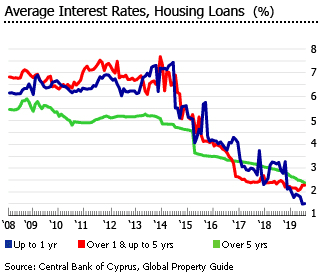
The ECB left its key rate unchanged at an all-time low of 0.00% in July 2019, after cutting it by 5 basis points in March 2016. In previous years, banks in Cyprus have been slow to respond to ECB interest rate cuts, because there is little inter-bank lending, so banks rely on customer deposits for funding. Many banks pay high rates to attract deposits.
Mortgage market declining
Despite the low interest rates, new housing loans to households fell by 3.9% y-o-y to €481.1 million (US$538.8 million) in the first half of 2019, according to the Central Bank of Cyprus. About 92% were pure new loans while the remaining 8% were renegotiated loans, with advances to local residents accounting for around 90% of housing loans.
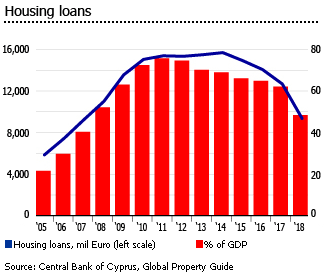
Likewise, total outstanding housing loans were down by 20.9% y-o-y to €9.48 billion (US$10.62 billion) in June 2019.
- Housing loans to domestic residents dropped almost 21% y-o-y in June 2019
- Housing loans to other euro area residents fell by 15.7% y-o-y in June 2019
- Housing loans to the rest of the world fell by 20.6% over the same period
From 29.1% of GDP in 2005, the mortgage market grew sharply to about 91.32% of GDP in 2012. But it has contracted sharply since, and was at 46.6% of GDP in 2018.
Rents rising sharply, yields are moderate
Average gross yields in Cyprus stood at 4.5% for apartments in 2018, up from 4.3% a year earlier and 4% two years ago, according to RICS. Likewise, gross yields for houses were 2.4% in 2018, slightly up from 2.2% in 2017 and 2.1% two years ago.
Nicosia and Limassol usually offer higher gross rental yields as compared to other Cypriot cities.
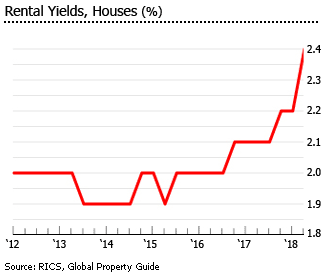
Across Cyprus, monthly rents for both flats and houses rose by double-digit figures during 2018. Residential rents are now at their highest level for five years.
By district, during 2018:
- Nicosia, Cyprus’ capital, apartment rents rose by 15% and house rents increased 17% in 2018 from a year earlier, according to KPMG.
- In Limassol, apartment rents rose strongly by 19% while house rents increased 8%.
- In Larnaca, the average rent for apartments and houses rose by 19% and 67%, respectively.
- In Paphos, apartment and house rents rose by 6% and 5%, respectively.
- In Famagusta, the average rent for apartments and houses rose by 8% and 14%, respectively.
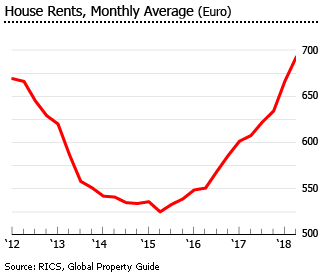
In Nicosia and Larnaca, 120 sq. m. apartments typically rent for about €700 to €800 per month, according to Global Property Guide research conducted in 2018.
Cyprus’ property title deeds fiasco remains unresolved
Property frauds in Cyprus are a huge problem for expat homeowners, but also for developers, banks, and the government. Many buyers have lost their homes after the developer went bankrupt, despite having paid in full.
Developers tend to keep the title deeds, neglecting to inform house-buyers that their title deeds will be withheld for an unspecified time, or that the land on which their property is built has been mortgaged by the developer. The bank, which holds the title deed as collateral, has the right to foreclose, but, under normal circumstances, it may take a bank between 9 to 12 years to obtain control over the property. So banks extend and pretend, until the developer goes broke.
Between January 2005 and June 2008 a total of 37,769 overseas buyers purchased 29,949 properties for which Title Deeds had yet to be transferred, according to the Cyprus Department Land Registry report published in October 2008. This figure of 29,949 included properties for which Title Deeds had yet to be issued, plus those whose Title Deeds were in the process of being issued. During the same three and a half year period, 4,440 properties were transferred to 5,988 overseas buyers.
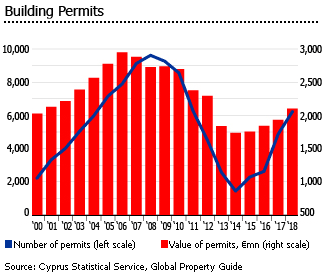
"Some cases have involved ´double selling´ fraud whereby the developer sells a property to Party A, fails to lodge the contract with the Land Registry, and then sells it again to Party B (possibly for a higher price) but fails to reimburse Party A," says Alan Waring, an international risk management consultant.
To resolve the scandal, a new directive on mortgage credit was adopted on January 28, 2014 by the Economic and Financial Affairs Council. The new rules address some of the amazing problems in the Cyprus market, such as insufficient pre-contractual information, irresponsible lending and borrowing, and misleading advertising and marketing. The directive establishes regulatory and supervisory principles for credit intermediaries, and provisions to regulate and supervise non-credit institutions.
The new law sets out conditions for ensuring professionalism amongst creditors and credit intermediaries; principles for marketing and advertising; obligations relating to pre-contractual information; requirements for information on the borrowing rate; and requirements to check the consumer’s creditworthiness; and disclosure obligations for the consumer.
The government also introduced a number of incentives to homebuyers and sellers. Those who buy property in the country until the end of 2016 were qualified for a 50% discount on their Title Deeds transfer fees tax. They are not also required to pay capital gains tax when they sell the property in future.
The property title deeds fiasco however remains unresolved. According to European Commission’s Post-Programme Surveillance Report of spring 2017, at the current rate of Title Deeds issuance, it would take about ten years to address the backlog of unissued Title Deeds, which already reached around 30,000.
"The currently dysfunctional Title Deeds issuance and transfer system is deterring potential investors and thus weighing on the liquidity of the property market," said the European Commission. "Although some measures were taken to streamline the issuance of Title Deeds for new properties, no new measure was announced to provide for a sustainable system of transfer of Title Deeds."
´Trapped Buyers´ law - the mess continues
Recently, the Immovable Property Transfer and Mortgage Law (Amendment) (No. 10) of 2015, better known as the ´Trapped Buyers´ Law or the ´Hidden Mortgages´ Law, was passed to help property purchaser(s) to obtain a Title Deed, if they cannot obtain one despite having fulfilled their contractual obligations to the vendor.
The following can apply for Title Deeds:
- The buyer who has yet to receive the Title Deed of the property he purchased
- The vendor of the property, whether a private individual or a property development company
- The lender who granted the loan to the property buyer
- The mortgagee under the mortgage contract deposited at the Land Registry
- The buyer who purchased the property thru assignment or vesting contract deposited at the Land Registry
- The Director of the Department of Lands and Surveys ex officio
The ´Trapped Buyers´ law appeared to restore confidence in the housing market. Out of the 13,642 applications received as of end March 2017 linked to trapped property buyers, about 5,700 Title Deeds were issued, which led to around 2,000 transfers of titles.
However, following legal actions taken by banks against the transfer of titles, a court ruled in May 2017 that the new law is unconstitutional because it violates Article 26 of the Constitution, which affords individuals the right to enter freely into a contract. As such, the land registry suspended procedures, as the government contemplated its next move.
In July 2019, the government approved amendments seeking to improve the 2015 law to finally resolve the problem. The amendments ensure the involvement in the process of all three parties – buyer, lender and seller – and afford the capacity of filing a substantiated objection and securing a court order within a defined timeframe to stop the transfer.
“We are affording the land registry a new opportunity to tackle legal obstacles set by the banks in the process,” said Akel MP Aristos Damianou.
The largest number of applications from trapped buyers was submitted in Famagusta, with 4,349 cases as of May 2019, followed by Paphos with 4,235 applications, Larnaca with 3,365, Nicosia with 3,100 and Limassol with 2,394.
Banking system improving
In 2012, Cyprus’ banking system collapsed. Like Iceland, Cyprus’ banking sector has long had a huge offshore banking sector. By 2012 the banking sector had assets of US$120 billion in an economy with a GDP of only US$24 billion, with US$60 billion of these assets involving Russian corporations’ deposits. Cypriot banks had a hard time making a return on all this money, and their response was to raise loan risk-levels, lending to Cyprus’ local property companies, and to the Greek government, which in 2012 experienced the largest sovereign debt default in history.
In March 2013, Cyprus became the fifth Eurozone country to get a bailout from the Troika, composed of the International Monetary Fund, European Central Bank and European Commission. Cyprus was lent €10 billion (US$11.9 billion). Included in the agreement was a haircut for bank deposits of more than €100,000 (US$119,300) at the country’s two largest banks-Bank of Cyprus, and Cyprus Popular Bank (Laiki Bank).
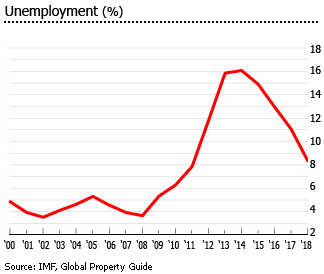
The terms required Cyprus to cut public sector spending, hike taxes, and cut its bloated banking sector. The loss of confidence had an enormous impact on the local economy, combined with the decline in tourism largely resulting from the Eurozone crisis, and the downgrading of the Cypriot government’s bond credit rating to junk status.
Over the last four years, Cyprus has had impressive policy achievements, ending its IMF bailout program before term. Significant legal and institutional changes were introduced. The banking system is now on more solid ground. Unemployment has begun to fall. The economy is growing strongly.
Banking system solvency is also improving. NPLs were about 30.6% of total gross loans in Q1 2019 – one of the lowest levels since 2013. The reduction in NPLs can be attributed to increased repayments, restructurings, write-offs, and settlement of debt through swaps with real properties intended to be sold for faster cash collection, according to the central bank. The housing market recovery is also helping improve Cypriot banks’ asset quality. Despite the significant improvement, it remains among the highest in the EU.
Currently, NPLs in the Cypriot banking system amounts to about €11 billion (US$12.3 billion), down from a peak of €28 billion (US$31.4 billion) in 2013 – a decline that can be considered as the fastest in the EU.
As a result, major credit ratings agencies have upgraded Cyprus’ rating in recent months.
- In April 2019, Fitch Ratings affirmed Cyprus’ rating at BBB- with a stable outlook, after upgrading the country to investment grade in October 2018, citing the country’s strong economic growth and prudent fiscal policy.
- In September 2018, Standard and Poor’s also raised the country’s sovereign bond rating to investment grade, more than six years after it had been downgraded into ‘junk’ territory.
- In July 2018, Moody´s Investor Service upgraded the country´s long-term issuer rating from Ba3 to Ba2 with a stable outlook.
Economic growth to slow; unemployment falling
Cyprus’ economy remains strong, registering a solid growth of 3.9% in 2018, driven by strong domestic demand and favourable external demand for Cypriot exports, according to the Statistical Service of Cyprus. In Q1 2019, the economy expanded by 3.4% from a year earlier, down from an average growth of 3.8% in the previous three quarters.
Economic growth is projected to slow to 2.9% this year and to 2.6% in 2020, amidst slowing tourism and escalating trade tensions globally, according to the European Commission. Tourist arrivals fell by 1.1% y-o-y in the first five months of 2019, in contrast to a 7.8% growth last year.
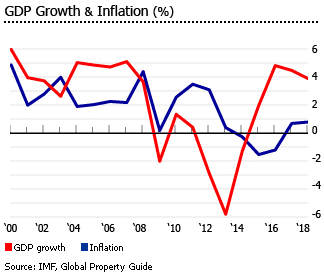
“Consumer sentiment has deteriorated over the first half of 2019 and business confidence has steadied, suggesting that growth could be less buoyant in the months to come,” said European Commission. “Private consumption is nevertheless expected to remain resilient, given positive labour market developments.”
Cyprus’ economy contracted about 2% in 2009, mainly due to the adverse impact of the global crisis. After registering anaemic growth rates of 1.3% in 2010 and 0.4% in 2011, the economy shrank again by 2.9% in 2012. The economy remained depressed in the following years, with a huge 5.8% contraction in 2013, and a 1.3% contraction in 2014, based on IMF figures. The economy recovered in 2015 with GDP growth of 2%. Economic growth accelerated further, with GDP growth of 4.8% in 2016 and 4.5% in 2017.
Cyprus recorded a public budget deficit of 4.8% of GDP in 2018, in sharp contrast to a surplus of 1.8% of GDP in 2017 and 0.3% of GDP in 2016, according to the Statistical Service of Cyprus.
Gross public debt widened to 102.5% of GDP in 2018, from 95.8% of GDP in the previous year, according to Eurostat. However, gross debt is expected to fall gradually to 101% of GDP this year and to 94.3% of GDP in 2020, according to the International Monetary Fund (IMF).
Inflation was -0.3% in July 2019, down from 2.3% in the same period last year, according to the Statistical Service of Cyprus. It was the second straight month of decline and the lowest level in 16 months.
Unemployment fell to 6.5% in June 2019, down from 8.3% a year earlier, according to Eurostat - the lowest unemployment level in eight years. From an average of just 4.8% from 2000 to 2011, unemployment had surged to an average of 13% from 2012 to 2018, according to the IMF.
Sources:
- Property Prices (European Central Bank): https://sdw.ecb.europa.eu/browse.do?node=9691220
- Cyprus Property Price Index Q2 2018 Prices as at 30/06/18 (RICS): https://www.rics.org/globalassets/rics-website/media/knowledge/research/market-surveys/cyprus-property-rics-index-2018-q2.pdf
- Cyprus property sales fall in all market segments (Cyprus Property News): https://www.news.cyprus-property-buyers.com/2019/07/04/cyprus-property-sales-fall-all-market-segments/id=00156957
- Cyprus real estate sales reach nine-year high (Financial Mirror): https://www.financialmirror.com/news-details.php?nid=37156
- Monetary and Financial Statistics (Central Bank of Cyprus): https://www.centralbank.cy/en/publications/monetary-and-financial-statistics/year-2019
- World Economic Outlook Database (International Monetary Fund): https://www.imf.org/external/pubs/ft/weo/2019/01/weodata/index.aspx
- Residential Property Price Indices (Central Bank of Cyprus): https://www.centralbank.cy/en/publications/residential-property-price-indices
- Consumer Price Index (Ministry of Finance, Statistical Service): https://www.mof.gov.cy/mof/cystat/statistics.nsf/economy_finance_14main_en/economy_finance_14main_en?OpenForm&sub=4&sel=2
- Rental returns in Cyprus are moderate, but property is inexpensive (Global Property Guide): https://www.globalpropertyguide.com/Europe/Cyprus/Rental-Yields
- Economic forecast for Cyprus (European Commission): https://ec.europa.eu/info/business-economy-euro/economic-performance-and-forecasts/economic-performance-country/cyprus/economic-forecast-cyprus_en
- European Commission forecasts 2.9% growth for Cypriot economy in 2019 (In-Cyprus): https://in-cyprus.com/european-commission-forecasts-2-9-growth-for-cypriot-economy/
- Unemployment in Cyprus down to 6.5% in June 2019 (In-Cyprus): https://in-cyprus.com/unemployment-in-cyprus-down-to-6-5-in-june-2019/
- Consumer Price Index (Statistical Service of Cyprus): https://www.mof.gov.cy/mof/cystat/statistics.nsf/economy_finance_14main_en/economy_finance_14main_en?OpenForm&sub=4&sel=2
- Cyprus Government Budget (Trading Economics): https://tradingeconomics.com/cyprus/government-budget
- Trapped buyers bill changes approved (Cyprus Property News): https://www.news.cyprus-property-buyers.com/2019/07/13/trapped-buyers-bill-changes-approved/id=00157036
- MPs in new bid to help trapped buyers (In-Cyprus): https://in-cyprus.com/mps-in-new-bid-to-help-trapped-buyers/
- Fitch affirms Cyprus ratings at BBB- maintaining a stable outlook (Financial Mirror): https://www.financialmirror.com/news-details.php?nid=36820